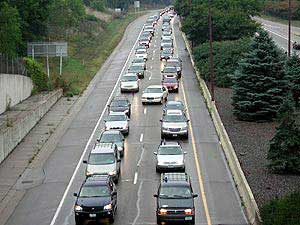Audio
Photos
More from MPR
Resources
| ||||||||||||||||||||||||||||||||||||||
January 26, 2005
 |
| The Minnesota Chamber of Commerce recommends a 5 cent per gallon increase in the gas tax to fund more highway and transit spending. (MPR file photo) |
St. Paul, Minn. — The chorus of voices has been rising for years, saying the state's roads and bridges are too narrow, too decayed and too congested to handle the volume of traffic. The numbers support the clamor. The census bureau shows double-digit increases in vehicle miles driven, and the state's own measurements show the pavement is decaying faster than it can be fixed.
The Minnesota Chamber of Commerce is proposing a 10-year, $6 billion plan to fix the problem. Chamber President David Olson says most of the money would come from a fuel tax increase, borrowing, federal funding, and shifting most of the vehicle sales tax revenue from the general fund to transportation.
Olson says the plan hinges on voter approval. Minnesotans, he says, should be asked to make the increased fuel tax and borrowing part of the state Constitution -- along with a constitutional requirement that the work would be done.
"We are not convinced that even our membership would support a gas tax increase if they didn't know that it was going to go to specific projects, if they didn't understand exactly what they're going to buy with it," Olson says.
The state Chamber of Commerce is a political ally of Republican Gov. Tim Pawlenty, who opposes a gas tax increase. Pawlenty has proposed a $7 billion transportation plan over 10 years that relies on $4.5 billion in borrowing to accelerate construction on projects beginning in 2007.
The chamber is attempting to build at least a semblance of bipartisan support for its ideas. Rep. Dan Larson, DFL-Bloomington, has signed on as a sponsor of the chamber's plan. He supports asking voters to approve a constitutional mandate.
"It's really asking the policy question of Minnesota voters, 'Is this how we should we fund transportation?' We believe that it is the way we should fund it," says Larson. "It will require difficult choices in the future, but we're willing to step forward and say those difficult choices should be on the table."
The chamber has selected 13 Twin Cities and 48 outstate Minnesota transportation projects they say need to be completed sooner rather than later. They include adding lanes to various Twin Cities freeways and highways, as well as roadway expansion and improvements on dozens of rural highways.
The costliest Twin Cities projects include a high-occupancy-vehicle and transit lane on Interstate 35W through south Minneapolis, reconstruction and expansion of portions of I-494, I-694 and highways 100 and 610.
Big-ticket outstate projects include speeding up work on a new river crossing near Clearwater along Interstate 94, expanding Highway 10 through St. Cloud, expanding highway 14 between Owatonna and Waseca, among other projects.
The drumbeat of support for increased transportation spending is being heard by lawmakers. However, Rep. Mary Liz Holberg, a Lakeville Republican and chair of the House Transportation Finance Committee, doesn't support the chamber's idea of making the plan a constitutional mandate.
"I think with the chamber plan, people have concerns about putting a tax increase into our Constitution. I think that's where a lot of people -- even if they support the gas tax increase, putting it in the Constitution just doesn't seem quite right," Holberg says.
The chamber proposal would break new ground for transit. It says voters should approve constitutional dedication of a portion of motor vehicle sales tax revenue for buses and trains, a goal long sought by transit advocates.
However, Transit For Livable Communities spokeswoman Sacha Peterson says the plan falls far short of meeting even the minimum funding level the Metropolitan Council has set as a goal for Twin Cities bus and rail.
"This plan gives transit about $100 million in predictable, stable money. So it's really only meeting about one-third of what the region needs, and what other regions such as Denver, Colorado are currently investing in transit," Peterson says.
The transportation funding plans offered by the Minnesota Chamber of Commerce, the Itasca Project, another group with business interests, and by Gov. Pawlenty have at least two themes in common. They rely mainly on adding more lanes of roadway to help ease congestion, and on massive borrowing to pay for it. The plans assume the investment will pay for itself, with increased tax revenue from a growing state economy.
The plans are are mostly silent on how to pay for the repair and maintenance of all the existing and proposed new transportation infrastructure once it is built.






